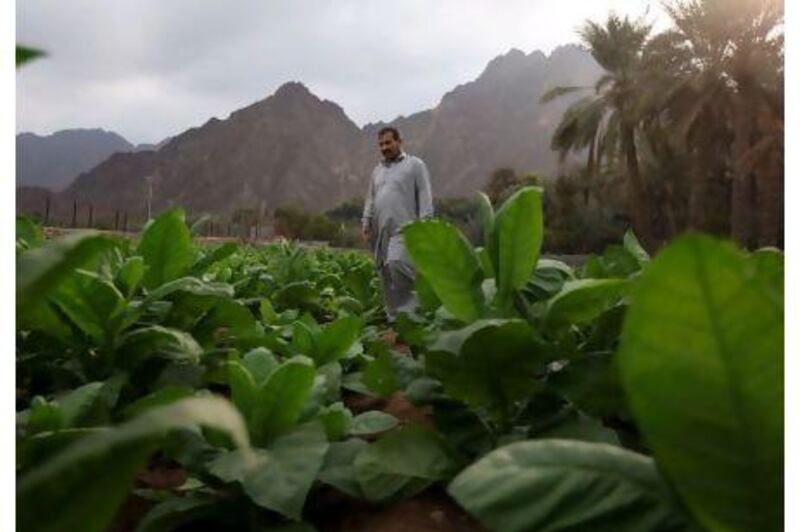HATTA // Among a dozen tins lining the wall of a tobacco shop in the town centre here, one bears the word "Hattawi", scrawled in calligraphy across its front. It is a blend named after an area that has been a centre of tobacco production for centuries. But the container could soon be empty, forever.
Dokha, a ground tobacco traditionally smoked in a thin pipe, has become popular among teenagers, a trend that has alarmed the Government. In response, and in an effort to reduce all forms of smoking, officials banned commercial tobacco farming about a year ago.
Many farmers in the region have abandoned the crop the government announced the ban, and this year's harvest is expected to be the last time the crop is grown in the UAE for personal use.
"All people in Hatta understand it's forbidden, and if Sheikh Mohammed bin Rashid says it's forbidden we will stop," said Ali Mohammed, a 43-year-old farmer who lives in Hatta. "They will farm only for themselves, not for others. These laws are good for us. Tobacco is a health problem for the chest and for the heart."
The ban was the final nudge that pushed many farmers to abandon struggling businesses and seek steadier sources of income. Water has been scarce for a decade, and most farmers have other jobs.
"Four years ago they could support their family with tobacco, but even before the laws came people started working other jobs, in oil, with the police, with the army, hospital, security," said Mr Mohammed. "I grew tobacco 25 years ago. Now I'm working in the army and my brother is working petrol, there is no time for it now. If you work with tobacco it is good for money, but it needs too much time. It needs care like a small child."
Abdulrahman Gulab Khan, a Pakistani farmer, tends to what will be his last tobacco crop on a farm near the town centre. The tobacco is grown in 27 5-metre-square plots and will be worth about Dh11,000. A single leaf will fetch Dh7.
"This is the last crop and this is only for my boss, it's not for sale," said Mr Khan, who said he was around 30. "Fifteen or 20 years ago there was so much tobacco here. Now, there's none because of the new laws. Anyway, there's not enough water. There's no rain."
The crop's popularity has declined as people have become aware of tobacco's health risks, said Abu Saif al Bidwawi, 59, a farmer from Hatta.
"At my farm I have lemons, mangos, palms and mint, but no tobacco," he said. "I don't like it. Before, people didn't understand about tobacco, but they would grow it for some money, but now, we don't do this anymore. We know from TV, radio and the newspapers how bad it is to smoke."
Hatta's reputation for potent tobacco had attracted businessmen from throughout the Gulf, who rented farms to grow the plant. Now they face the prospect of shuttering the shops they have operated for decades.
It is the first year in decades that Ismael Hassan, a tobacco salesman, has not visited the farm in Oman on which his family grows the tobacco they sell in their RAK store. A plot for which he pays Dh25,000 a year in rent can produce tobacco with a retail value of Dh300,000, but he can no longer take it across the border.
"This tobacco is left over from before," he said, pointing to a row of shelves. "Maybe the price will go up later, but not now. Abu Dhabi will have a lot of supplies and the price will stay low. We have enough to last two or three years."
Though he speculates that the industry could be gone completely in five years, his customers are more hopeful.
"The quality in Oman is different, and the farms are better than in RAK," said Saeed, 33, a RAK native whose father grew tobacco. "Maybe the dokha will stop in the UAE, but there are other suppliers, and even the sheikhs take dokha."
Meanwhile, retailers have toughened their stance on selling traditional tobacco to minors in the last year to comply with stricter laws, teenagers have said.
While minors smoking dokha is still a common sight, it has become increasingly difficult for them to buy it directly, since laws have forbidden its sale to minors. Facial hair is no longer considered adequate proof of age, and youngsters increasingly rely on friends for their supplies.
“Before, if the man saw we had facial hair he would give it, but now he gives us questions, questions, questions,” said M D, a 17-year-old Emirati who has smoked dokha for two years and asked not to be identified by name. “They ask for your licence. Now I ask my friends to give me dokha. The store will not give it now.”
Half of M D’s friends said they did not smoke and had less interest in dokha than their older brothers because they were more aware of its adverse effects.
“I don’t do it because of my health,” said Mohammed al Zaabi, a grade eight student. “Only a few of my friends smoke midwakh. ”
Talib al Hosseini, 17, agreed, and said he feared the consequences of smoking for a different reason.
“I am a sportsman and dokha is bad for my body,” he said. “I tell my friends not to smoke. From when I was young, my fathers and brothers told me it’s bad. They would kill me.”






